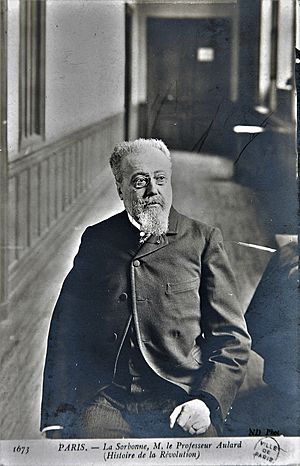François Victor Alphonse Aulard facts for kids
François Victor Alphonse Aulard (born July 19, 1849 – died October 23, 1928) was a very important French historian. He was the first professional historian to focus on the French Revolution and Napoleon. His main goal was to make studying history in France more organized and professional.
Aulard believed that the French Revolution changed society a lot. He said it got rid of old systems, made people more free, and shared land more fairly. It also removed special privileges for nobles and made everyone more equal. He thought the French Revolution was special because it wanted to help all people, not just those in France.
Contents
Aulard's Career and Studies
Aulard was born in a town called Montbron in France. He went to a famous school, the École normale supérieure, in 1867. He earned his doctor's degree in 1877. He first studied literature and even translated works by Giacomo Leopardi.
From Literature to History
Aulard then switched his focus to history. He studied the speeches made by politicians during the French Revolution. He published two books about these speakers. These books showed he was a careful scholar. He knew a lot about the original documents from the French Revolution.
Researching the Revolution
Aulard used strict historical rules to study the French Revolution. He spent a lot of time researching in archives. Archives are places where old documents are kept. He published many important works about the politics, government, and social life of that time.
His most famous work was a four-volume book called Histoire politique de la Revolution française. Aulard thought Georges Danton was a better leader than Maximilien de Robespierre. He saw Danton as the true spirit of the Revolution. Danton inspired France's defense against its enemies.
Teaching at the Sorbonne
In 1885, Aulard became a professor at the Sorbonne. He taught the history of the French Revolution. He helped many students learn how to do valuable historical research. His ideas were sometimes seen as very new and even controversial. In 1893, during one of his courses, there were strong disagreements among students. Some supported his views, while others did not.
Kropotkin's View
Peter Kropotkin, a Russian thinker, wrote in 1909 about Aulard's work. Kropotkin said Aulard had shown a lot about the Revolution's political side. However, Kropotkin felt that more study was needed on the economic side of the Revolution.
Aulard as an Editor
Aulard was also a very busy editor. He collected and published many important historical documents. These documents help historians understand the French Revolution better.
Major Document Collections
He edited a huge collection of documents from the Committee of Public Safety. This committee was very powerful during the Revolution. He also collected documents about the Jacobins, a famous political club. Another collection he edited was about life in Paris during and after the Revolution.
Other Edited Works
Aulard also worked for a historical society. He edited their important magazine, La Revolution française. He published records from the provisional government. He also edited reports about the state of France in the years 1799 and 1800. He helped publish works and memories written by people who lived during the Revolution.
Aulard wrote many articles too. These were gathered into nine volumes called Etudes et leçons sur la Révolution française. He also wrote a book criticizing another famous historian, Taine. Aulard's criticism was very detailed and showed his deep knowledge.
Aulard's Positivist Approach
Aulard's way of writing history was based on something called positivism. This means he believed that the method of research was most important.
Focus on Facts and Sources
A historian's job, for Aulard, was to present facts in order. These facts had to be carefully checked. Historians should also look at how facts are connected. They should provide the most likely explanation. It was essential to use full documentation. This meant doing deep research in original sources.
Aulard led the way in publishing important documents. He also trained students to use and analyze these original sources correctly. His famous four-volume history of the Revolution focused on debates in parliament. It looked at public opinion, elections, and laws. He understood that the Revolution faced challenges. For example, in 1793, leaders gave all men the right to vote. But they also created a strict government during the Reign of Terror.
Criticisms and Legacy
Aulard's work is still discussed today because of his political views. His place in history is still debated.
Strengths and Weaknesses
His history focused on the government and political changes. This was different from his student, Albert Mathiez, who looked at broader topics. Some critics say Aulard's anti-religious and strong republican views affected his research.
However, Aulard's professionalism and loyalty to historical sources inspired many scholars. He helped build a new way of understanding the Jacobin legacy. He focused on the needs of the state more than on party differences. He strongly supported international democracy and human rights.
See also
 In Spanish: François-Alphonse Aulard para niños
In Spanish: François-Alphonse Aulard para niños
 | Jewel Prestage |
 | Ella Baker |
 | Fannie Lou Hamer |


